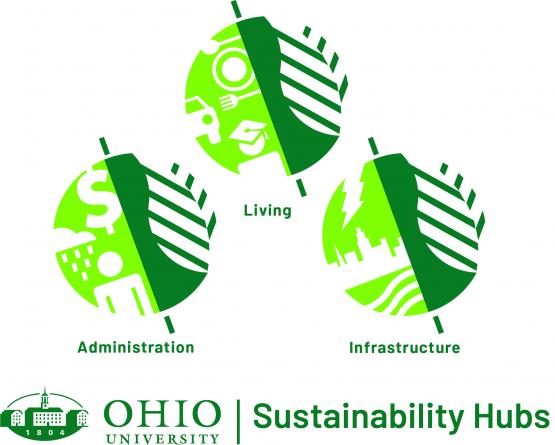Sustainability Hubs
Sustainability Hubs details
The Hubs are engagement ecosystems. These engagement ecosystems are not a physical space or an academic department, but an approach to strategic initiatives. Each Hub will be led by a faculty coordinator who recognizes the advantage to approaching challenges collaboratively with input from diverse perspectives. The coordinator will foster connections between faculty, staff, students and community members who are working on sustainability initiatives that have been identified as priorities in the Ohio University Sustainability and Climate Action Plan. The Ohio University Sustainability Committee provides oversight to the Sustainability Hubs, in accordance with the charter of the Sustainability Committee.
Hub participants will be able to connect with each other and with initiatives through:
- a bi-weekly newsletter,
- a monthly seminar series,
- the Climate and Sustainability Ambassadors (a student group that encourages, promotes, supports and leads OHIO Sustainability initiatives)
- the Sustainability Project Laboratory
- the webpages for themes in the Sustainability and Climate Action Plan (see individual themes under the "Hub Themes" tab above)
- the Hub Coordinators and the Office of Sustainability staff
The Sustainable Infrastructure Hub will focus on the sustainability themes of buildings, energy, water and waste and the Sustainability Project Laboratory. Example initiatives are the Eco-Challenge program, LEED Lab courses, Race to Zero Waste or GameDay Recycling Challenge, residence hall energy and water challenges, reuse and repair fairs, ENERGY STAR Building Treasure Hunts, or any other types of energy efficiency, smart growth, building improvement, water savings, waste reduction, or renewable energy projects.
The Sustainable Living Hub will focus on the sustainability themes of food, transportation, grounds and student life and the Farm to OHIO Working Group. Example initiatives are edible gardens, the OHIO Student Farm, Culinary Services sustainability programs, Bobcat Pass and other alternative transportation programs, food composting systems, the Ohio Ecohouse, student sustainability organizations, or any other projects relating to local foods, active transportation, organic landscaping or sustainable student experiences.
The Sustainable Administration Hub will focus on the sustainability themes of procurement, investments, human resources and climate and the Climate & Sustainability Ambassadors. Example initiatives are flexible work arrangements, sustainable investing, wellness programs, sustainable procurement policies, Second Nature's Carbon Commitment, We Are Still In commitment, and any other projects relating to employee well-being, local purchasing, investment strategies, diversity and inclusion, or carbon neutrality.
2019 Annual Report for the Sustainability Hubs
2020 Annual Report for the Sustainability Hubs
2021 Annual Report for the Sustainability Hubs
Hub Coordinators
Position Summary
The Sustainability Hub Coordinators (Sustainable Administration, Sustainable Infrastructure and Sustainable Living Hub Coordinators) will oversee and coordinate core collaborative academic sustainability efforts at Ohio University. Each of the three leaders will launch or advance one or two initiatives in themes of the Sustainability and Climate Action Plan (SCAP), potentially by creating or using Sustainability Project Laboratory (SPL) academic projects. Fostering connections for other initiatives within and between Sustainability Hubs is also encouraged. Leaders will organize or give one seminar on a sustainability initiative each semester and will report annual progress to the University Sustainability Committee.
Eligibility
All faculty, though preference will be given to faculty members with existing sustainability efforts in research, engagement or teaching.
Action Goals
- Support Sustainability Hub (Infrastructure, Administration or Living) components
- Support Sustainability and Climate Action Plan core components (curriculum, research, engagement and administration)
- Increase awareness of sustainability
- Report sustainability progress
- Collaborate within the Office of Sustainability
Terms of Contract
- $10,000 in salary will be provided annually for each Hub Coordinator.
- Office of Sustainability staff, graduate assistants, and student staff will provide support for these positions
- Coordinator positions are for either 2- or 3-year terms, and are potentially renewable, based on progress toward goals.
2018 restructuring announcement from former President Nellis.
